Building an engaged community of followers is one of the best ways for creators, entrepreneurs, and other expertise-based businesses to thrive over the long term. Below you’ll find our top 5 online community platform picks – but we recognize that our favorites might not be the best option for you. Keep reading for in-depth reviews of each and detailed information on ten different online community platforms.
How We Evaluate and Test Online Community Platforms
Reviews of platforms on the Learning Revolution site are overseen by the site’s founder, Jeff Cobb, an e-learning industry expert with more than 20 years of experience working with online courses and related platforms. All evaluations are conducted by a team of analysts who have extensive experience using, testing, and writing about these types of platforms. We dedicate numerous hours to researching each platform, ensuring each aligns with the needs of online course sellers, and vetting specific areas like core features, usability, pricing, and customer satisfaction. Our reviews are unbiased, and while we will participate in affiliate programs, if available, we do not accept payment for placement in our articles or links to external websites.


Community Platforms: Build, Engage, and Grow Your Business
To succeed as an edupreneur, creator, or expertise-based business, you need to do more than just create and distribute content. You also need to build a community around your brand. This will help you drive engagement, boost your reputation, and grow your audience.
Standard websites, course platforms, and membership site platforms are not always the best community platforms. They may have some tools for building and managing memberships, but their community features are often limited. So, most entrepreneurs need to look elsewhere for the best community features.
Fortunately, there are many dedicated community platforms that provide just that. They give you powerful tools for building all sorts of communities, which you can run alongside your established web presence or online course business.
However, not all online community platforms are created equal. They vary in their capabilities and pricing. And some membership platforms misleadingly try to sell themselves as “community platforms” when they offer very few actual community features.
To help you out, this article covers the best community platform options for entrepreneurs and expertise-based businesses. We’ll explore all-in-one community platforms, free community platforms, open-course community platforms, community platforms for professional networks, and community platforms for brand promotion.
What is a Community Platform?
A community platform is a specialized software solution that creates, hosts, and powers online communities, including learning communities. It provides tools to manage community membership, discussions, and other communications.
“Community,” in this case, is an interactive online space where people with shared interests can connect with you and each other using tools like discussion forums and messaging. Community members share ideas, resources, feedback, thoughts, and concerns related to a common subject or theme.
For example, the WordPress community is an online space where WordPress developers and enthusiasts from all over the globe can discuss and exchange ideas on various WordPress-related issues. Their contributions have played a critical role in the growth of the WordPress platform.
The best community platforms help you set up and maintain communities around your expertise-based business. This is a great way to keep the buzz and interest alive among your course students and prospects.
The Best Community Platforms by Category
Here’s a quick preview of the best community platforms by category:
- Mighty Networks: Best All-Inclusive Community Platform
- Bettermode (formerly Tribe): Best Community Platform for Brand Promotion
- BuddyBoss: Best WordPress-Based Community Platform
- Circle: Best Easy-To-Use Community Platform
- Vanilla Forums: Best Community Platform for Enterprise Users
- Hivebrite: Best Community Platform for Professional Networks
- Discourse: Best Open-Source Community Platform
- Disciple: Best Community Platform for Monetizing Communities
- Khoros: Best Community Platform for Analytics
- Thinkific: Best for Combining Courses and Community
Below, you can find in-depth reviews of each community platform included in this list.
1. Mighty Networks
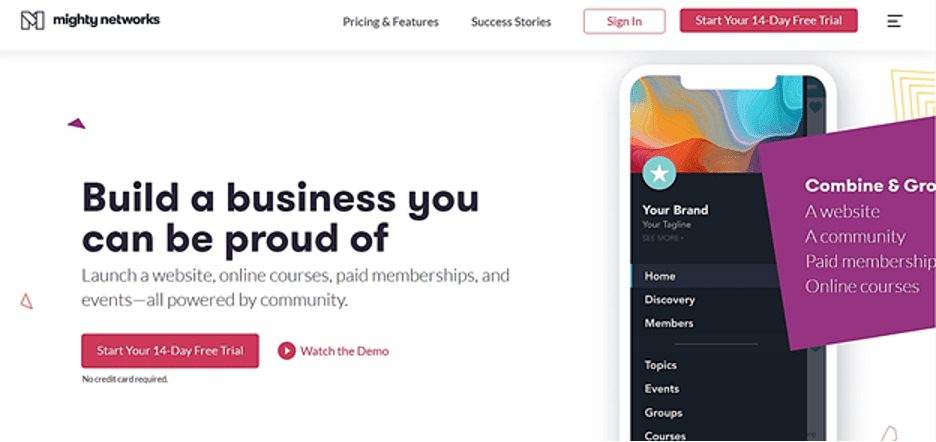

Best All-Inclusive Community Platform
Mighty Networks is an all-in-one platform for edupreneurs and content creators who want to build and manage a community around their online courses. It offers a wide range of features, including:
- Website Builder
- Online course builder and editor
- Content management system
- Membership platform
- Community platform
One of the challenges of using a single platform for so many different things is that it can be difficult to learn how to use all of the features. However, Mighty Networks has intuitive tools that make it easy to set up community spaces and facilitate interactions between your community members.
For example, you can provide your community members with chat messages, member categories, subgroups, and a personalized activity feed. Community members can interact with each other through text messages, images, sound files, videos, comments, polls, and questions.
Mighty Networks also comes with flexible monetization capabilities. It is easy to charge members for access to the spaces you create. Overall, Mighty Networks is a powerful option for anyone who wants to start a community-driven online course business. It is an independent platform that offers all of the basic business functionalities on one dashboard. This means that you do not need to use any third-party tools.
Mighty Networks Main Features
- Unlimited storage for files and photos
- Member management, reporting, anti-spam, and anti-abuse tools
- Unlimited video storage for courses
- Online courses
- Public, private, or secret virtual groups
- Public, private, or secret local groups
- Local or virtual events
- Community polls and questions
- Leaderboard for active community members
- Member search by category and location
- Private direct messaging between members
- Member profiles with custom categories
- Contact importing
- Mass messaging to all community members
- Posts, comments, and cheers
- Activity feed for text, links, images, and video
- Unlimited community moderators, admins, and members
Mighty Networks Pricing
Mighty Networks offers a free 14-day trial and if you decide to sign up, they offer 3 pricing plans: Community, Business, and Mighty Pro.
Might Networks offers 3 pricing tiers:
Community Plan – $39 per month or $33 per month when paid annually.
This includes:
- Native Livestreaming & Video
- Chat & Messaging
- Events & Zoom Integration
- Paid Memberships
Business Plan – $119 per month or $99 per month when paid annually.
You’ll Get everything included in the Community Plan, plus:
- Online Courses
- Live Cohort Course Creation
- Featured Pages & Events
- Analytics & Member Data
- Zapier APIs & Workflows
Pro Plan – Pricing for the Pro Plan is custom, contact Mighty Networks to learn more.
The Pro Plan includes everything in the Community and Business Plans, plus:
- Your Own iOS & Android Apps Available in the Apple App Store and Google Play Store
- Branded App Notifications
- White-labeled web and app experience
- Strategy and Migration Services & Support
Mighty Networks Pros and Cons
| Pros | Cons |
|---|---|
| All-in-one platform for online courses, memberships, websites, and communities. | Charges a percentage rate for transactions. |
| An unlimited number of community members, moderators, and admins. | Doesn’t support SSO integrations. |
| Built-in monetization tools for online communities. | Limited community gamification. |
| Free iOS and Android mobile apps. | |
| Personalized activity feeds for community members. | |
| Finds community members by categories and location. | |
| Unlimited content storage. |
See our full Mighty Networks review >>


2. Bettermode (formerly Tribe)
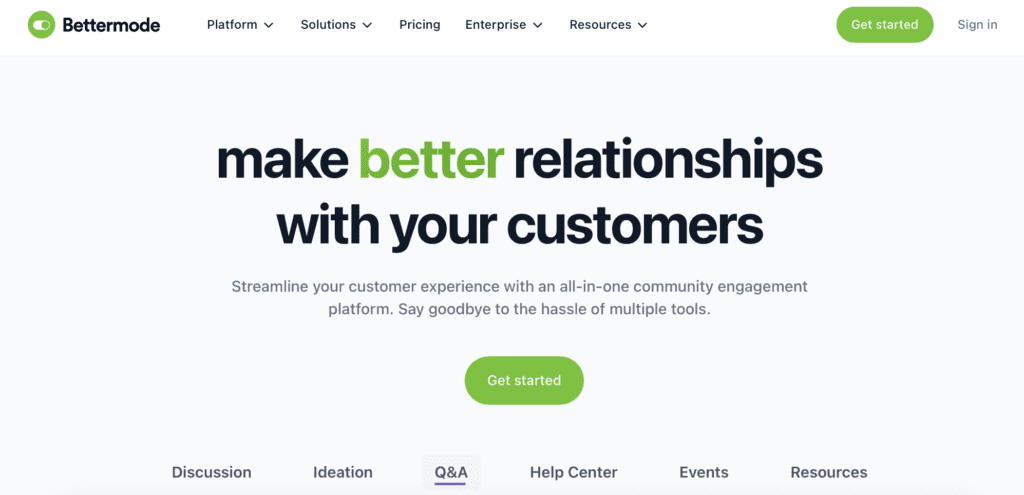

Best Community Platform for Brand Promotion
Given that it only focuses on building and managing communities – without the online course extras – Bettermode is not as robust as Mighty Networks. On the flip side, what it does it does quite seamlessly.
For example, Bettermode has perfected the art of white labeling. You get to build not just communities, but ones that are customized entirely based on your brand – from the widgets and logos to the domain and layout colors. You can set them to run as fully-branded community websites on mobile and web browsers, or maybe as PWA apps. The choice is all yours.
The communities themselves follow the standard social media architecture, meaning you can tweak your site to resemble and operate like social media sites such as Facebook and LinkedIn. What’s more, Bettermode offers a social login feature that allows your community members to sign in with their social media credentials. You can have them log in via their Twitter, Google, LinkedIn, Slack, and Facebook accounts.
Then, to keep the community members engaged, Bettermode allows you to set up a personalized activity feed, as well as gamify the experiences. You can, for example, rally members using virtual currencies, membership points, badges, and a leaderboard.
Bettermode (formerly Tribe) Main Features
- Single sign-on and social login.
- White-labeling
- Public and private communities.
- Custom domain.
- Customize in real-time with an intuitive interface.
- Reach members via omnichannel notifications.
- Personalized activity feed.
- Granular level analytics.
- Customizable community landing page.
- Discussion topics based on user interest.
- Keyword blacklist and profanity blocker.
- Moderation panel for allowing, editing, and rejecting posts.
- Embeddable third-party content.
- Customizable Open Graph tags.
- SEO-friendly.
- Members can ask questions, post answers, upvote, and accept the right solution.
- Thread-based communication between members.
- Organize community by spaces.
- Migration assistance.
Bettermode Pricing
Bettermode offers a free trial only by use case so you need to contact them to see if that’s an option.
Currently, their starting plan, Advanced, with access to the white-label privileges starts at $599/month.
Bettermode Pros and Cons
| Pros | Cons |
|---|---|
| Extensively customizable. | Price. |
| White-labeled communities. | Limited community members. |
| Single sign-on capability. | No built-in monetization tools. |
| Multiple community gamification options. | Doesn’t offer mobile apps. |
| Structures communities by spaces. | |
| Supports custom domains. |
3. BuddyBoss
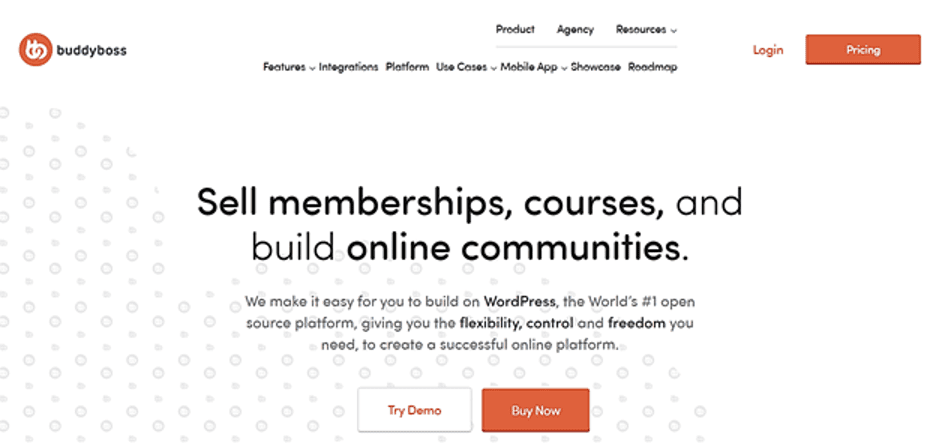

Best WordPress-Based Community Platform
If you’re thinking of enhancing your WordPress-based site with community capabilities, your best bet is the BuddyBoss community platform. It comes in the form of a plugin, which enables community capabilities once you add it to your WordPress portal.
While the plugin itself is pretty light, it doesn’t hold back when it comes to powering communities. It provides everything you’d expect in the best community platforms – just enough tools to turn your WordPress dashboard into a fully-fledged community platform.
You can, for example, use it to set up personalized activity feeds, notifications for members, group messaging, private messaging, member directories, social groups, social posts, sub-groups, etc. What’s more, BuddyBoss makes it possible for you to host your own live events via Zoom. Of particular importance to many Learning Revolution readers, BuddyBoss is one of the few community platforms that seamlessly supports major WordPress-based learning management systems (LMS). It has native integrations with LearnDash and LifterLMS,among others.
But that’s not all. BuddyBoss also offer the ability (at additional cost) to create your own branded native mobile app, which community members can then access through their Apple App Store and Google Play Store accounts.
BuddyBoss Main Features
- Create site-wide events or group only events for members.
- Create and manage custom file extensions.
- Set privacy for your personal documents and social group documents.
- Fully compatible with WordPress.
- Members can share any file type.
- Customizable email API.
- Custom push notifications to community members.
- Global, personal, and group feeds.
- Private 1-on-1 message to all the members of a social group.
- Thread-based group messages.
- Create your own member dashboard.
- Create one-time and/or recurring online class sessions.
- Create organizers or moderators within a group.
- Create public, private, or hidden groups.
- Custom profile types and fields.
- Learning Management System (LMS) integration.
- Community gamification.
BuddyBoss Pricing
BuddyBoss starts at $228 per year for one website.
You can also purchase a 5-site license for $288 per year or pay $388 per year to run it on 10 websites.
BuddyBoss Pros and Cons
| Pros | Cons |
|---|---|
| Fully compatible with WordPress. | Not compatible with non-WordPress sites. |
| Integrates with LearnDash, LifterLMS, and Tutor LMS. | The process of setting it up can be technically challenging for non-coders. |
| White-labeled native mobile apps. | Doesn’t offer a free package. |
| Supports membership plugins. | Its third-party integrations can add up. |
| Facilitates extensive customization. | |
| Community gamification. |
See our full BuddyBoss review >>


4. Circle
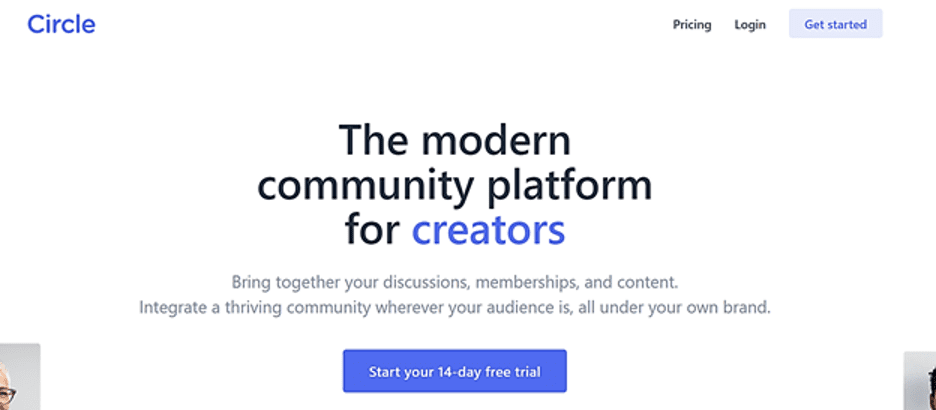

Best Easy-To-Use Community Platform
While many community platforms try to squeeze in as many features as possible, Circle takes a minimalistic approach. This is the community platform for you if you prefer to keep everything neat and clutter-free.
Circle is built to handle just the most critical elements of community creation and management. You’ll find it easy to set up discussion boards, moderate the community, facilitate private messaging and member connections, and organize content.
Circle’s modern, simplistic design doesn’t cater to administrators alone. Community members also get the benefit of working with an intuitive user-friendly interface. The system makes it convenient to navigate the community boards and participate in both group and private discussions.
iPhone users can download a native iOS mobile app for CIrcle through the Apple App Store. Unfortunately, the same cannot be said about Android-based gadgets. The company is yet to roll out a compatible mobile application through the Google Play Store.
When it comes to integrations, however, Circle has made a good attempt at blending into various ecosystems. You can easily embed it into your site as a full community, or partially in the form of selected community spaces and widgets.
Circle Main Features
- Integrate your community right into your website, product, online course, or membership.
- White-labeled community experience.
- Neat, modern interface design.
- Rich posts, member profiles, and direct messaging.
- Organize community discussions in public or private spaces.
- Single Sign-On (SSO) support.
- Automated community moderation.
- iOS native mobile app.
- Supports custom domain.
- Custom CSS & JavaScript.
- Circle Community AI.
Circle Pricing
Circle offers three pricing plans.
The cheapest is Basic, which accommodates 10 spaces and 1,000 community members for $49 per month.
Professional, on the other hand, gives you an allowance of up to 100 community spaces and 10,000 members for $99 a month – while Business is $219 and Enterprise is $399.
Circle Pros and Cons
| Pros | Cons |
|---|---|
| Modern, intuitive interface design. | No Android mobile app yet. |
| Communities can easily be embedded on third-party sites. | Limited community members, spaces, and content storage. |
| Native iOS mobile app. | No native online course capabilities (but integrates with Teachable). |
| Facilities SSO integrations. | |
| Automates community moderation. | |
| Easy to use. | |
| White-labeled community. |


5. Vanilla Forums
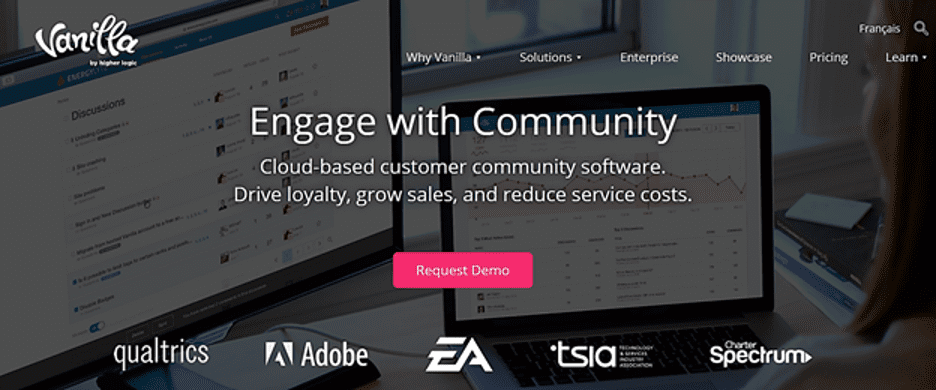

Best Community Platform for Enterprise Users
Vanilla Forums isn’t your regular community platform for member-to-member interactions. It is, instead, specially optimized to help mid-sized businesses and enterprises engage with their customers and prospects. The principal objective here is to enhance sales and drive loyalty through strategic audience engagement and customer support.
Basically, it’s a strong choice when you need a community platform that’ll push your growing business to the next level.
Businesses can use the platform to build and run up to 20 sub-communities at once. Then to help you manage all that, Vanilla Forums allows you to assign community administration to up to 100 staff members.
You can then engage audiences through a variety of methods, including private messaging, forum discussions, questions and answers (Q&A), and knowledge bases. Vanilla Forums also tries to enhance community experiences through features such as gamification, notifications, and ideation – while administrators get to capitalize on smart history, avatars, federated search, automated summaries, revision history, and performance tracking.
Vanilla Forums Main Features
- Control fine-grained, role-based permissions.
- Create, edit and delete users and user use-cases.
- Open Graph protocol to help social media display the right content.
- Supports the most popular social logins,
- Multiple SSO protocols.
- Groups can be public, secret, or private.
- Private one-on-one discussions between members.
- In-page and email notifications for members.
- An advanced editor that recognizes HTML, BBCode, and Markdown.
- Post questions and polls.
- Reward members with ranks.
- Profile pages display a member’s reputation, badges, and recent activity.
- Custom badges.
- Reputation scores for members.
- Peer-based moderation.
- Community members are allowed to submit and vote on ideas.
- Community-driven knowledge base.
- Customize the community with custom CSS.
Vanilla Forums Pricing
Vanilla Forums is available in four packages – all of which are designed for the needs of mid-sized businesses and enterprises. The lowest cost package starts at $689 per month.
Vanilla Forums Pros and Cons
| Pros | Cons |
|---|---|
| Specially optimized for mid-sized businesses and enterprises. | Can be costly to small businesses and solopreneurs. |
| Supports extensive customization. | The customization process is a bit too technical for non-coders. |
| Numerous gamification features. | |
| Provides a community-driven knowledge base. | |
| Integrates multiple SSO protocols. | |
| Enhances customer support. | |
| Accommodates up to 100 staff users at a time. |
6. Hivebrite


Best Community Platform for Professional Networks
Sixth on our list of the best community platforms is Hivebrite, a community management solution that’s specially optimized for alumni networks, nonprofit organizations, and most importantly, professional networks. This is the type of platform you turn to when your target audience is professionals in a particular field.
With Hivebrite, you can create a LinkedIn-type experience– one that allows community members to share opportunities, exchange ideas on the best practices, network and collaborate with their peers, and distribute industry news.
Members can, for example, easily share presentations, documents, and videos, as Hivebrite’s media center is capable of supporting all media formats. You can also allow members to create dedicated groups or forums based on their interests and locations, network in-person after checking in via community maps, or crowdsource support for projects.
Another distinguishing feature of Hivebrite is that it enables community members to push job opportunities through job boards. Employers can post open vacancies, while job seekers get tools for uploading and sharing their resumes.
The platform also allows you to group member networks together, host events and sell tickets, integrate customer relationship management systems, send out push notifications and emails to members, manage content through a content management system, offer native mobile access through branded iOS and Android apps, and embed social media sign-in options for Facebook, LinkedIn, and other major networks.
Hivebrite Main Features
- Communicate with other members through private messages.
- Create groups to match specific organizational models.
- Donation pages and campaigns.
- Create membership plans and determine associated prices and privileges.
- Create discussion forums around specific topics.
- Allow members to display their projects.
- Job boards for finding and sharing opportunities.
- An integrated email marketing tool.
- Social networks integration.
- Organize events for your community.
- An integrated content management system.
- Powerful search and targeting filters.
- Import and export member data.
- Resume upload and sharing for community members.
- Engagement scoring that identifies the most active users.
- Engagement and email analytics.
Hivebrite Pricing
The only free options with Hivebrite are a demo and a time-limited trial. Beyond that, pricing starts at $500 per month for the basic plan.
Hivebrite Pros and Cons
| Pros | Cons |
|---|---|
| Offers professional tools for connecting partners, investors, and co-founders. | Can be costly for solopreneurs and small businesses. |
| Allows members to post jobs and share opportunities. | No native online course capabilities or established LMS integrations. |
| Comes with an integrated email marketing tool. | |
| Gives you the chance to set up branded mobile app versions of your community. | |
| Engagement analytics reveal the most active users. | |
| Provides built-in monetization tools. |
7. Discourse
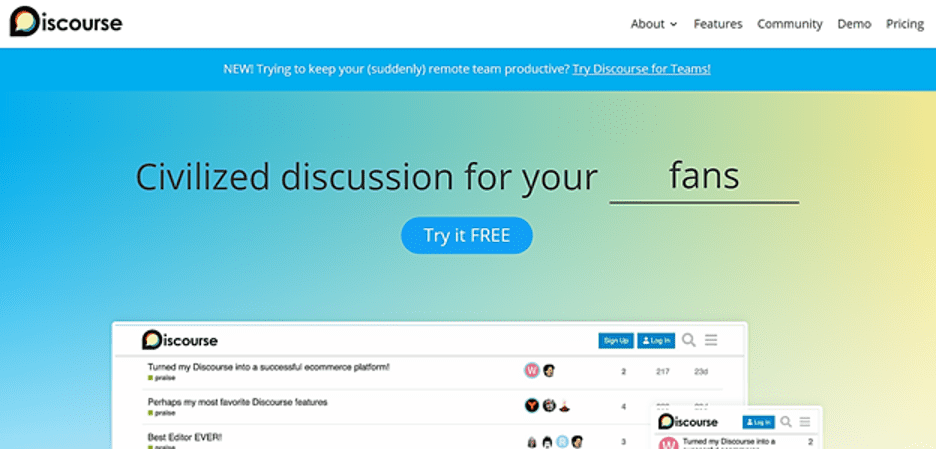

Best Open Source Community Platform
Discourse is one of the few community platforms also takes a community approach with its code. It comes with a framework that’s 100% open source, allowing you to endlessly tweak the underlying code.
But don’t let that scare you if you’re not into coding. The default Discourse platform is actually simple enough to be comfortably used by all types of edupreneurs, including the technically unskilled ones. You’ll be pleased that its interface is quite neat and straightforward, as it focuses only on the most important stuff.
Right off the bat, you’ll be able to create custom communities, add administrators to help you with community management, an onboard moderator. What’s more, the platform enables you to easily set up and organize categories, threads, and topics. Then, instead of dividing discussions into cluttered sub-forums, Discourse takes the approach of listing them by their categories.
As for community members, they’ll find pretty much the same features their accustomed to with established social media giants like Facebook. They can easily share content, message their peers, interact through mentions, and comment on posts.
But that’s not all – Discourse also saves you the frustration of dealing with spammers, trolls, and the likes through an internal defense system that’s capable of building automatic immunity. You can count on it to consistently flag suspicious activity, as well as help you with content moderation.
Discourse Main Features
- 100% open source code.
- Comprehensive API.
- Custom badges for community members.
- Condense long topics to just the most interesting and popular posts.
- Add common social logins like Google, Facebook, and Twitter.
- Built-in Akismet spam protection and heuristics.
- Replies flow down the page in a line.
- Incoming and outgoing link tracking.
- Self-managing member groups.
- Easily add private spaces.
- Sitewide alerts and pinned topics.
- Inline and bulk moderation.
- Personal messaging.
- Embeddable polls.
- Anonymous posting.
- Email invitations.
- Automatic and custom avatars.
- Global CDN support.
- Automatic backups.
- Markdown, BBCode, and HTML formatting in posts.
- SEO optimized for Google indexing and searching.
- Translates between more than 46 different languages.
Discourse Pricing
As an open-source platform, you’d probably expect Discourse to offer its tools for free. That’s not the case – the only free thing here is a trial that runs for 14 days. Once that ends, you’ll be paying at least $100 per month to use the platform.
Discourse Pros and Cons
| Pros | Cons |
|---|---|
| 100% open source community platform. | Private messages between members can be accessed by administrators. |
| Built-in spam protection and heuristics. | Setting it up can be a bit cumbersome for users who are not technically skilled. |
| Runs polls. | No native online course capabilities or established LMS integrations. |
| Supports anonymous posting. | |
| Provides automatic translation for over 46 languages. | |
| Your whole community platform is automatically SEO-optimized. | |
| Intuitive and user-friendly. |
8. Disciple
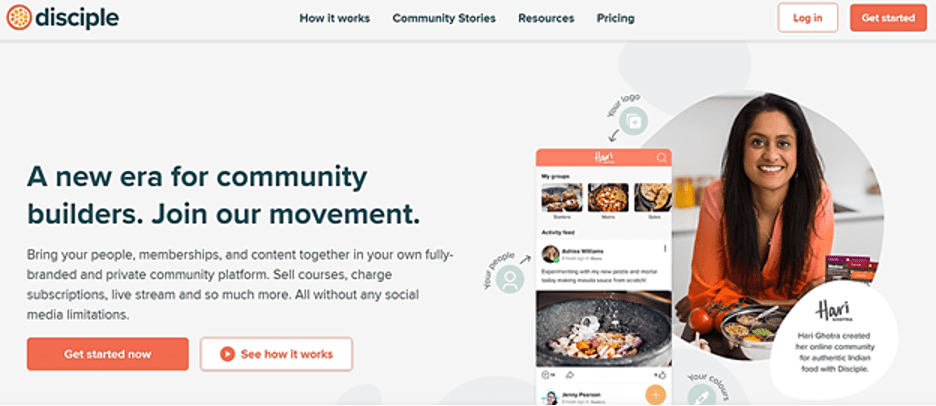

Best Community Platform for Monetizing Communities
Your monetization strategy doesn’t always have to be restricted to online courses and membership subscriptions. You can, for example, make money from sponsorships and advertisements – and Disciple can help you do just that, along with a range of other monetization options.
Disciple allows you to create and distribute sponsored posts within your communities, as well as direct traffic to landing pages.
You can also set up premium subscription options to give paying members access to exclusive areas of the community. Disciple even helps you entice prospects with free trials and freemium content offers.
The platform also makes it possible for community creators to generate money from in-app purchases and paid app downloads. This capability is courtesy of its iOS and Android apps, which you could ultimately publish in the respective app stores as fully-branded mobile versions of your community.
While you customize the app, Disciple allows you to choose the content areas that you’d like to lock off as premium sections, accessible only through in-app purchases.
The platform isn’t only about monetization, though. Disciple manages to maintain the same level of flexibility when it comes to community creation and management.
You can, for example, set up fully-branded communities, create subgroups, schedule and post any content format, track community metrics, moderate members’ posts, build personalized feeds, as well as segment and manage audiences with private and public groups.
Disciple Main Features
- Connect with audiences through targeted push notifications.
- Live video streaming to your entire community.
- Track vital engagement metrics.
- Moderation tools.
- Schedule unlimited posts.
- Drive polls.
- Threaded comments.
- Custom member profiles.
- Private messages between community members.
- Content library.
- Charge subscriptions.
- Personalized activity feed.
- Segment members by interest and demographic.
- Multiple monetization options such as membership subscriptions, exclusive content, sponsorships, and much more.
- Private and public groups.
Disciple Pricing
The Disciple community platform has a rather unique way of charging its users. What you end up paying depends on the community versions you choose to build, the volume of members you intend to host, and the add-ons that you decide to integrate.
The grow plan hosts up to 500 members on unlimited space at $759 each month for 6 months. The last option is the Pro Plan for $1,199 each month for 6 months which hosts 5,000 members.
As for the add-ons, you can expect to pay as little as $20 per month to as much as $130 a month, depending on the specific add-on.
Disciple Pros and Cons
| Pros | Cons |
|---|---|
| Numerous community monetization options. | Accommodates a limited number of community members. |
| Custom branded Android and iOS apps. | Considerably costlier than its closest competitors. |
| Built-in live streaming tools. | Charges transaction fees. |
| Personalized messages and notifications for targeted audiences. |
9. Khoros


Best Community Platform for Analytics
Keeping tabs on all the interactions happening within your online community can be challenging – unless, of course, you’re running it all on Khoros.
Khoros comes with a pretty robust AI-driven analytical engine. Once you build a community for sharing experiences, developing expertise, providing answers, and growing your brand, you can count on Khoros to monitor all the interactions, and then provide you with real-time analytics about your audience engagement.
You’ll get valuable insights into how your members are interacting, what they respond best to, their customer journeys, and more. And, of course, you can leverage that data to optimize the performance of your community.
Khoros’ Engagement Manager, which offers advanced moderation capabilities, also leverages AI. It’s effective at recognizing, flagging, and blocking off content that might be inappropriate or offensive to your community members.
To top it all off, Khoros Communities offers advanced gamification capabilities, community syndication, and analytical tools like heuristic analysis, and user journey mapping.
Khoros Main Features
- Motivate customers to engage with your brand through gamification.
- Workflow automation for moderators.
- Profanity and abuse detection.
- Configurable spam management.
- Benchmarks from more than 400 brand communities.
- Shareable dashboards.
- Real-time analytics.
- Automatic tagging, routing, and prioritization.
- Content syndication.
Khoros Pricing
The ability to leverage artificial intelligence in your community comes with a premium price tag. Khoros is probably the highest priced option covered in this round-up. You’ll have to contact the company for a personalized quote but expect to pay mor than $3K per month – and that’s before adding on modules for things like gamification, or a knowledge base.
Khoros Pros and Cons
| Pros | Cons |
|---|---|
| Keeps tabs on your members’ community activities. | Beginners might face a slight learning curve. |
| The Khoros Engagement Manager facilitates intelligent community moderation. | Expensive for small businesses and solo edupreneurs. |
| AI-driven. | No native course capabilities or established LMS integrations |
| Leverages benchmarking data from more than 400 brand communities. | |
| Robust content management. | |
| Seamlessly integrate into business systems such as CRM, SSO, Marketing Automation, LMS, etc. | |
| Integrates personalized content into the customer journey. |
10. Thinkific


Best for Combining Courses and Community
Thinkific is an online course platform with built-in tools to help you design, create, launch, promote, and sell your educational offering.
In addition to the content creation and website building tools, you also get access to Thinkific Communities.
This is a new feature that allows you to create and manage online learning environments where learners can participate in an interactive educational experience to help drive engagement and boost learning outcomes.
Each community is a landing page on your Thinkific website where learners and instructors can interact through posts (text, image, or video) and comments. You can split each community into “spaces” to further organize your members into relevant groups.
Unlike many other online community builders that offer tons of impressive bells and whistles that you will likely never use, Thinkific’s main focus is on simplifying the process of creating and managing your online group so you can spend more of your time taking care of more important matters in your business.
The Communities feature provides you with multiple ways to engage and monetize your audience. With the updated community builder, you can price, package, and sell your community just like any other digital product.
Use communities with your existing courses or offer them as a standalone product. Your community can be free, or you can convert it to a paid product (memberships) to generate an additional source of revenue for your business.
Thinkific Communities Main Features
- All-in-one course creation and community connection
- Customizable community page
- Flexible spaces to organize community
- Member count on the main page
- Member profiles and mentions for increased engagement
- Thread-based communication between members
- Notifications for new posts, replies, or reactions
- Branded mobile app
- Community analytics
- Community moderator roles
- Trending posts
- Live events
- Custom domain
- Unlimited community members
- Bulk import member contacts
Thinkific Communities Pricing
Thinkific has four pricing plans to choose from when building your online course. Each plan comes with the ability to create an online community and spaces within that community.
The free plan lets you create 1 community with 2 spaces. The Basic plan costs $36/month and allows you to build 1 community with 5 spaces. The Start plan costs $74/month for 1 community with 10 spaces.
If you intend to build more than one community, then you’ll need to upgrade to the Grow plan which costs $149/month and lets you build 3 communities with 20 spaces per community.
Thinkific Communities Pros and Cons
| Pros | Cons |
|---|---|
| Easy to set up and use | Limited capabilities for community organization |
| Integrates smoothly with other products on Thinkific | Inability to make spaces private, or to group multiple spaces together |
| Structures online community by “spaces” | Users can’t choose which notifications to receive among all the spaces they’re part of |
| Robust community management features | |
| White-labeled native mobile app | |
| Built-in tools for monetizing your online communities |
See our Thinkific Community review >>
Community Platform FAQs
What’s the difference between a community platform and a membership platform?
While a “community platform” tries to help you set up a social-based site that brings together individuals with common interests and goals, a “membership platform” primarily seeks to control content access without necessarily linking up the registered members.
As such, you’ll find that membership platforms don’t always come with social features like messaging and discussion boards. Community platforms, on the other hand, power all sorts of social interaction features to keep the conversations alive.
What is the cheapest community platform for edupreneurs?
All things considered, the best low-cost community platform for edupreneurs is Mighty Networks.
Besides providing a decent permanently free package, it allows you to set up and run an extensive community – with an unlimited number of members, admins, and moderators – for as low as $23 per month.
What is the best community platform for WordPress users?
If you’re running a WordPress-based website, your best community platform option is BuddyBoss.
This open source plugin is capable of not only powering your WordPress communities, but also helping you sell online courses (through its LMS integrations), as well as memberships (via its membership platform integrations). You can also use it (at additional cost) to build a branded native mobile app for iOS and Android users.
That’s why, so far, BuddyBoss has managed to serve more than 50,000 businesses.







